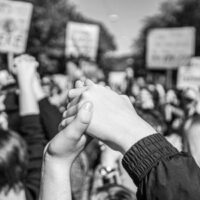Arrests Involving Protests

With protests being organized across the country, anyone considering attending should do so with a clear understanding of the potential dangers to your liberty. As we’ve observed, there have been plenty of arrests at political demonstrations in recent times. So participate while clear-eyed and focused on your goals.
First: Peaceful Protest is Legal
Many consider peacefully protesting as a key strategy in speaking truth to power. Protests are a way to expose injustices in society and demand government action. Throughout history in the U.S. and elsewhere, protesting has played a critical role in shaping societal norms and legal responses to issues of disparity and discrimination that have plagued humanity. Unfortunately, even though it is a right guaranteed by the Constitution, sometimes the government response is far from the desired outcome.
When Arrests Occur
People who attend protest gatherings and marches risk the possibility of arrest if they are perceived as participating in any of the following activities:
- Unlawful assembly—meaning the gathering has been judged to be threatening to public safety, riotous or violent, or individuals refuse to disperse when ordered by police;
- Disorderly conduct—such as blocking traffic, participating in offensive chants, or otherwise is viewed as disturbing the peace;
- Trespassing—including into government buildings or commercial offices when unauthorized;
- Vandalism—including tagging, starting fires, breaking glass, damaging vehicles, and so forth.
- Rioting– Notably, even when just a particular group of individuals engages in violent or vandalizing activity, anyone present can be charged;
- Assault/battery—including for minor scuffles, and particularly for altercations that become aggressive between protesters, counter-protesters, or law enforcement;
- Incitement/conspiracy—when you encourage others to engage in criminal activities;
- Obstructing justice—including blocking law enforcement access to the scene or engaging in evidence tampering;
- Resisting arrest—such as by trying to run from officers, putting up a fight, or even going limp.
State or Federal Charges
Depending on where the alleged civil disobedience occurs will be the main factor in determining whether charges are state, local or federal. Protesting in federal buildings or property will likely result in federal charges. That means that even if you’re held in a local jail, the U.S. Attorney will be deciding what happens, and the consequences will likely be more significant. State or local charges are more likely when typical streets, sidewalks, and parks are involved, which means the local City or District Attorney will be involved in the case.
Defending You and Your Rights
Whether you are facing state or federal charges, the dedicated Las Vegas criminal defense attorneys at Lobo Law will fight to protect your rights and your liberty. To discuss your situation, schedule a confidential consultation in our Miami office today.
Source:
amnesty.org/en/what-we-do/freedom-of-expression/protest/
